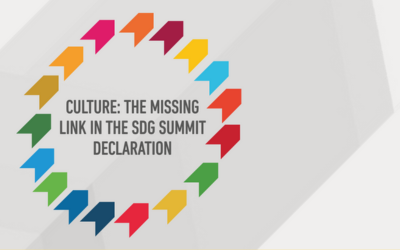Now or never: The Culture2030Goal campaign urges explicit inclusion of culture in the SDG Summit Declaration
 The Culture2030Goal campaign advocates to National Governments and on the international stage for the formal inclusion of culture in sustainable development. As a founding member of the campaign, ICOMOS calls on the UN to recognise culture as a driver of sustainable development during the SDG Summit at the HLPF in September 2023.
The Culture2030Goal campaign advocates to National Governments and on the international stage for the formal inclusion of culture in sustainable development. As a founding member of the campaign, ICOMOS calls on the UN to recognise culture as a driver of sustainable development during the SDG Summit at the HLPF in September 2023.
2023 is the halfway mark of the Sustainable Development Goals, and the outlook for delivery of the 2030 Agenda is poor. The General Assembly of the Economic and Social Council released an advanced unedited report on ‘Progress towards the Sustainable Development Goals: Towards a Rescue Plan for People and Planet’ in May 2023 that stated that;
“A preliminary assessment of the roughly 140 targets with data show only about 12% are on track, close to half, though showing progress are moderately or severely off track and some 30% have either seen no movement or regressed below the 2015 baseline.”
In the 43-page report, the transformative role of culture was not mentioned once, nor was heritage. This lack of mention was further compounded by continued oversight in the Revised Zero Draft of the Political Declaration to be adopted at the High-Level Political Forum on Sustainable Development (HLPF), released on 8 May 2023. As the first UN SDG summit since the UNESCO World Conference on Cultural Policies and Sustainable Development - Mondiacult 2022, the lack of reaffirmation of the Mondiacult Declaration is disappointing.
ICOMOS and the member organisations of the Culture2030Goal campaign have issued a call to amend the Zero Draft for the SDG Summit and recognise the work done at Mondiacult
Click HERE to read the call.
We call upon our members to get in touch with culture ministries, UNESCO National Commissions, and Permanent Missions to the United Nations to share this message and urge them not to miss this opportunity. Together, we can all contribute to the integration of culture and pave the way for a more sustainable and culturally inclusive culture!
Advocating for Change
Change in the current approach to sustainable development can only be achieved through understanding and acceptance. ICOMOS supports the development of Voluntary National and Local Reviews through the support of our expert members. Through the Culture2030Goal campaign, we create accessible resources and documents, adding a cultural dimension that expands the full understanding of integrated sustainable development.
This year, ICOMOS has also restarted its engagement with the UNESCO Institute of Statistics, and we advised UN-DESA, UN-Habitat and UNDP on the importance of culture in the SDGs. These engagements allow multi-disciplinary advice to be developed, and it promotes a process of putting culture as a goal and identifying potential key targets that can be tracked for the post-2030 Agenda.
Working Together for a Better Future
While these are long-term goals, it is imperative that the work currently being done at the intersection of sustainable development and culture is recognised in future declarations and documents being published by the United Nations and its organisations.
The member organisations of the Culture2030Goal campaign, and other like-minded organisations and individuals, will continue working together to widen the understanding of culture’s importance to all future sustainable development.
